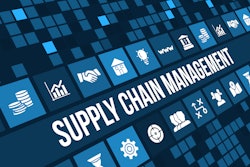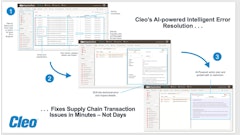
The pandemic put a new focus on the importance of explicit contracts and remedies. Now that supply chains have normalized somewhat, companies are reevaluating their contracts and contracting practices. Negotiating and administrating multi-party agreements is often a lengthy and time-consuming process, all while the supply chain and logistics industry contends with the lasting impacts of under-resourcing.
Optimizing the contract review and negotiation process can streamline operations, improve customer satisfaction, and improve the bottom line. A business can only move at the speed of its contracts, so a robust contracting function is essential for supply chain and logistics companies to operate smoothly and profitably.
Get on the AI Train
A critical step in optimizing contracting is for supply chain and logistics companies to get on the AI train. Artificial intelligence is revolutionizing nearly every industry and function and contracting is no exception.
Pre-execution contract review and negotiation technology can be a game-changer for contract management. By harnessing natural language processing (NLP) and machine learning algorithms, pre-execution contract review technology can automatically analyze contracts, identify potential risks, and suggest improvements. This saves legal and procurement teams significant time and effort, ensuring faster contract turnaround. By automating time-consuming tasks, providing real-time insights and mitigating risks, this technology can save businesses time, money, and headaches.
Here are some additional benefits of pre-execution contract review technology:
- Increased compliance: By identifying potential risks and issues early on, and ensuring legal teams are relying on their previously negotiated, approved language, pre-execution contract review technology can help businesses avoid costly compliance violations.
- Improved efficiency: By automating tasks, pre-execution contract review technology can free up teams to focus on more strategic work.
- Enhanced decision-making: By providing real-time insights, pre-execution contract review technology can help businesses make more informed decisions about their contracts.
Create Playbooks that Define Terms and Service Level Agreements
Effective supply chain and logistics contracts require clearly defined performance metrics and standardized service level agreements (SLAs). Parties should clearly define expectations and terms relating to transit time, on-time delivery, order accuracy, freight damage rates and other common supply chain risk factors. Setting up clear expectations and performance benchmarks within the contract ensures parties are held accountable and can deepen business relationships.
Counsel for logistics and supply chain companies should involve relevant stakeholders in defining these metrics and parameters to ensure their contracts are meeting business objectives, regularly reviewing provisions and standard terms if business needs or circumstances change.
AI can assist with this process of standardizing and updating language. Contract review technology can draft and negotiate contracts according to companies’ previously agreed-upon terms, saving legal teams time and resources. “Playbooks” can streamline the contract review process and create uniformity in contract negotiation across organizations.
Know What’s in Your Contracts
Supply chain and logistics companies often have a revolving set of contracts in various stages of proposal, negotiation, and execution, so keeping track of delivery deadlines, payments and expiration dates is a challenge. Enterprises should consider adopting contract lifecycle management (CLM) technology to manage contracts post-execution. CLMs that incorporate generative AI perform well at extracting key data from large volumes of text like contract sets – this data can then be automatically inputted into other systems such as accounting and billing, or automatically trigger notice processes or initiate renewals.
Managing contracts with more precision means that supply chain and logistics companies can mitigate risk that could be lurking in their contracts and help flag problems and potential lapses in delivery before they become big issues.
Leverage Data Insights
There is a wide array of technology available to supply chain and logistics companies that can offer data and insights into their deliverables and systems. Real-time tracking, inventory management software and data analytics enable businesses to gain visibility into shipment status, inventory levels, and overall supply chain performance. This enhanced visibility helps identify inefficiencies, make data-driven decisions, and proactively address potential disruptions.
Data insights can also aid in making contracting more efficient and reducing risk in organizations’ contracts. For example, if a certain delivery timeline is contracted to take 60 days but is routinely taking 75-80 days according to the analytics, organizations may need to renegotiate and adjust expectations (and contract playbooks) accordingly. Contracts should operate in the real world as much as possible. By leveraging data insights and making routine adjustments to their contracts, companies can ensure that their contracting reflects reality. This can also strengthen relationships with vendors across supply chains. Automated contract playbooks enable organizations to make these changes across contract sets nearly effortlessly.
Prioritize Change Management
Perhaps most crucial to incorporating technology into supply chain and logistics contracting is making sure people adopt it. A tool is only impactful if it is being used to its fullest capabilities. Organizations should seek to optimize their contracting process with technology that is easy to adopt and requires as little change management as possible. But even with a seamless onboarding process, there are several common barriers to adopting contract technology.
One is the fear by employees whose main function is contracting that they will be replaced by AI – however, commonly this is unfounded. More streamlined contracting enables employees to focus more on strategy, relationship-building and other, higher-value tasks.
Another barrier to technology adoption is the current trust deficit with leveraging AI, particularly generative AI. For efficiencies to be realized, users must have enough trust in the technology that they won’t have to manually repeat the work to check everything it has produced. Going forward, those aiming to make contracting more efficient through technology and AI should ensure users are educated on the tech they’re using and make sure users retain control. Context is also important for helping those negotiating and managing contracts insight into what’s in the “black box” of AI. Tools that not only suggest changes to a contract but explain why they have done so – based on a company’s playbook or past changes that are similar – will be key to promoting technology adoption that optimizes contracting.
As supply chain and logistics companies re-evaluate their contracts, they have an opportunity not only to optimize contract language, but also to improve contracting processes. As the logistics industry looks to risk-proof and improve, better contracting should be part of the equation.


![Pros To Know 2026 [color]](https://img.sdcexec.com/mindful/acbm/workspaces/default/uploads/2025/08/prostoknow-2026-color.mduFvhpgMk.png?auto=format%2Ccompress&bg=fff&fill-color=fff&fit=fill&h=100&q=70&w=100)







![Pros To Know 2026 [color]](https://img.sdcexec.com/mindful/acbm/workspaces/default/uploads/2025/08/prostoknow-2026-color.mduFvhpgMk.png?ar=16%3A9&auto=format%2Ccompress&bg=fff&fill-color=fff&fit=fill&h=135&q=70&w=240)







